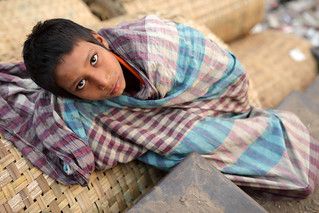
Published :
Updated :

Almost a third of street-involved boys in Dhaka are victims of survival-driven sexual exploitation, according to landmark national research released on Monday by The Freedom Fund in collaboration with government agencies, research institutions, and leading child protection organisations.
The findings, drawn from two major studies titled Through Her Eyes and Beneath the Surface, were presented at a national dissemination event at Bangladesh China Friendship Conference Center ... in the city attended by senior representatives of government, UN agencies, INGOs, NGOs, and survivor leaders.
Based on extensive surveys, qualitative interviews, and hotspot mapping across 63 high-risk locations and three major brothel communities, the studies provide the most comprehensive evidence in recent years on child sexual exploitation in Dhaka.
Together, they uncover alarming trends in recruitment, coercion, and long-term abuse, shedding light on both the vulnerabilities of girls and the often-overlooked exploitation of boys, who remain largely invisible in national child protection systems.
The research reveals that exploitation is occurring not only in brothels but also in highly public and accessible spaces such as parks, transport terminals, river ports, and roadside workplaces. Survivors recounted abusive and restrictive environments in which mobility was severely limited and violence was routine.
Speaking as the chief guest, Mamtaz Ahmed NDC, Senior Secretary of MoWCA, stressed the need for an inclusive and improved approach to protecting vulnerable children.
"It is important to have a better safe house and social welfare system, and we want your advice in upgrading it," she said.
"Girls and boys are being pulled into exploitation through different but equally brutal pathways," said Khaleda Akter, Country Representative of The Freedom Fund Bangladesh.
"Girls are deceived through promises of care or financial security, while boys are pushed into survival sex because they are hungry, homeless, and unprotected. These findings must drive stronger policies, adequate investment, and an unwavering commitment to prioritising children's safety."
The study focusing on girls shows they were often first contacted in childhood-typically in early adolescence-through emotional manipulation, false promises of marriage, or offers of jobs in urban areas.
Once brought to brothels or street-based operations, their movement became highly restricted and they were subjected to routine violence by exploiters. Many noted that escape was nearly impossible without outside intervention. Poverty, domestic violence, family breakdown, and internal migration emerged as root causes pushing girls into the hands of traffickers.
The companion study on boys presents an equally distressing reality. Boys aged 12 to 17 described daily struggles to find food, safe places to sleep, and protection from harassment.
A significant proportion reported engaging in sexual acts in exchange for meals, temporary shelter, or small amounts of money, often with adult men who approached them in parks, transport hubs, or secluded public areas.
Researchers noted that boys remain largely excluded from child protection discussions, while Bangladesh has very few gender-responsive shelters designed to meet their specific needs for long-term counselling, health services, and reintegration support.
Md Saidur Rahman Khan, Director General of the Department of Social Services, acknowledged the critical gaps highlighted by the findings.
bdsmile@gmail.com


 For all latest news, follow The Financial Express Google News channel.
For all latest news, follow The Financial Express Google News channel.